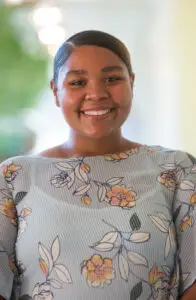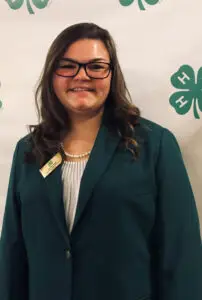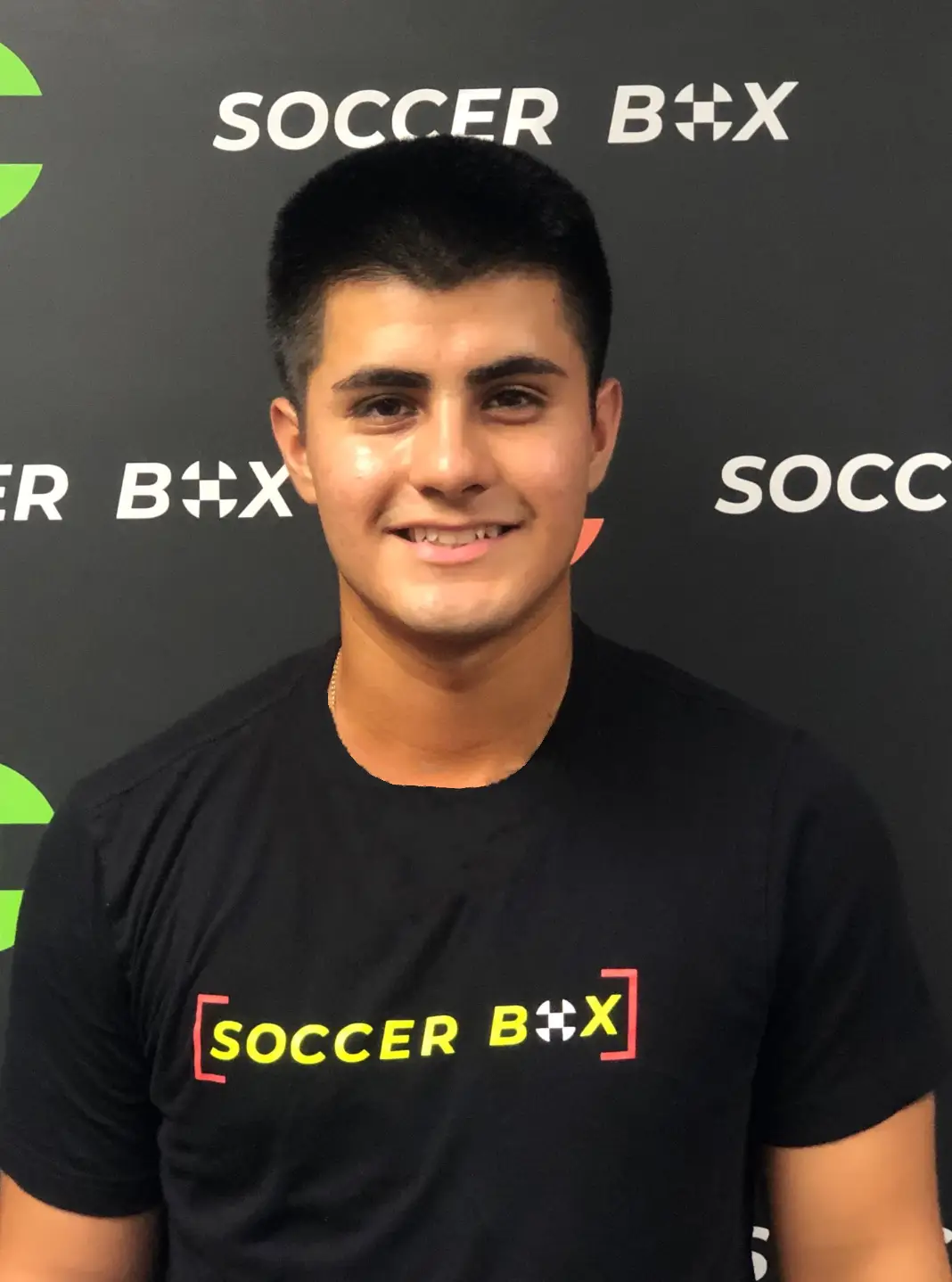Despite the pandemic, the Golden LEAF Scholarship Program continued to provide scholarships, internships, and leadership opportunities to rural N.C. students. This year marks the tenth anniversary of the Golden LEAF Scholars Leadership Program (GLSLP), the optional leadership program available to the Foundation’s scholarship recipients attending the state’s four-year colleges and universities. Approximately 300 students participate in the optional leadership training each year.
On Saturday, September 5th, scholars attended a virtual leadership conference held for their professional and personal development. The theme of this year’s conference was centered around the importance of resilience in a time of uncertainty. Many Golden LEAF Scholars were able to share personal experiences of overcoming the challenges brought on by the pandemic. In an address to scholars at the virtual conference, Golden LEAF President, Chief Executive Officer Scott T. Hamilton echoed that message of hope and urged the leaders of tomorrow to learn from the challenges of today.
“Golden LEAF recognizes that one of the best investments we can make in rural communities is to support a skilled and educated workforce,” said Hamilton. “You are going to be the leaders of your communities. This year has not been the path we thought we were setting out on. Sometimes, we learn more from the tougher path than an easier path. Let us learn from that and move forward.”
Four scholars shared their stories of working hard through the uncertainty to stay on path and complete their internships. Even during a pandemic, these future leaders of our rural communities showed that with resiliency even the toughest obstacles can be overcome.

Alonso Hernandez of Wilson County
Wilson County native Alonso Hernandez is a sophomore at the University of North Carolina at Charlotte. The exercise science major completed an internship at Soccer Box in Wilson this summer.
Hernandez had a planned internship that fell through, but he regrouped and created a great opportunity for personal growth by interning at Soccer Box, while putting his entrepreneurial talents to work.
“Originally, I was going to intern at a physical therapy facility, but that was cancelled due to COVID-19,” said Hernandez. “I decided to work at Soccer Box, a soccer training center. While at Soccer Box, I coached soccer athletes from entry level to college level. I had my own sessions with goalkeepers and aided my supervisor with the premier and pro sessions. I would study goalkeeper training sessions and create a training plan for the goalkeeper sessions.”
During his spare time, Hernandez started a small business.
“I started a mobile car detailing business called East Coast Sudz,” said Hernandez. “I hope this business can keep growing. I plan to eventually use the money I make from this business to invest in other things that will have a positive impact on my future. Through my business, I have been able to financially support myself, and business has been great so far.”

Makayla Jefferys of Vance County
Makayla Jefferys, native of Vance County, is a junior at the University of North Carolina at Chapel Hill, majoring in Human Development and Family Studies. She completed an internship at Beckford Warren Medical Center in Warren County.
Jefferys acknowledged that she had some reservations about working in a medical office during a pandemic but had resolved to work through it.
“Personally, I had some anxieties about getting sick or getting others sick, but the precautions we took as a team both in the office and out of the office helped me through,” said Jefferys. “There were several new protocols at the office, and we were always wearing our masks, sanitizing equipment after each patient, and frequently washing and sanitizing our hands. The office even started offering online visits. To see this advancement in a rural clinic made me so proud of our accomplishments.”
By conquering her fears, Jeffreys was able to shadow a physician and interact with patients. She also picked up new skills.
“The nursing staff taught me how to do vital signs and run the lab, where I had the chance to run analysis on urine and blood samples,” said Jeffreys. “Once I mastered the lab, I operated the lab on most of my days there this summer. This internship has made me realize it is my passion and destiny to return to rural N.C. after completing college.”

Jesse Blevins of Wilkes County
Jesse Blevins of Wilkes County is attending North Carolina State University. The junior is studying accounting with a concentration in information systems. He worked over the summer at InfusionPoints, LLC, a cybersecurity business in Wilkes County.
Blevins initially faced obstacles landing an internship due to the pandemic but was able to overcome those setbacks.
“There were several scheduling issues with my internship due to the COVID-19 outbreak,” said Blevins. “Luckily, my personal internship schedule was delayed by only a day. Because there were not many employees who worked on-site during the pandemic, I participated in virtual meetings to engage with other departments.”
Blevins was given several assignments at InfusionPoints where he was able to learn and grow.
“My supervisor taught me the financial tracking methods that the organization uses to record and analyze cash inflows and outflows,” said Blevins. “I was taught a basic level of the Python language, which I used to experiment on temporary databases, user interface, and program functionalities. I really appreciate what this program has done for me. The Golden LEAF Scholars Leadership Program has given me opportunities to network and connect in ways I would have never achieved on my own.”

Cecilia Tadt of Alexander County
Cecilia Tadt of Alexander County is a senior at the University of Mount Olive. She is majoring in agricultural production systems with a concentration in outreach extension education. Tadt completed her summer internship at Wayne County Cooperative Extension in Wayne County.
Tadt faced similar struggles in finding an internship this summer due to the pandemic, but she stayed the course and was able to work at a local cooperative extension in a different capacity than she has in past years.
“At the Wayne County Cooperative Extension, I worked with the promotion of the Farm Credit Farmers Market marketing platforms,” said Tadt. “I have always liked to advocate for our farmers, so this was a great way for me to use my skills. Halfway into my internship I decided to put together a Vendor Spotlight video to be posted on Facebook and Instagram to help advocate for our vendors. The vendors loved the videos, and it was a great way to promote their business.”
Tadt is using this experience to write a research paper about the farmers markets during the COVID-19 pandemic and as part of her graduation requirements.
“The internship was the biggest part of the Golden LEAF Scholars Leadership Program for me,” said Tadt. “I was able to intern in three different counties during my three years in the program, all extension related. I am grateful for my professional development experiences and the connections I’ve gained within the industry.”
Golden LEAF Scholars across the board embody resilience. This summer, in times of disruption, they found a way to make the most of their internship opportunities. Through these efforts and a commitment to completing the program, the scholars contributed to their local communities and supported their workforce goals, which is what the Foundation’s leadership program is all about.
“The national pandemic provided many challenges for my scholars,” said Gennifer Jones of Anson County, a Golden LEAF Scholarship Alumna and GLSLP Coach. “However, I think this was a crucial life lesson. It showed them that life is unpredictable, but you must continue to try in the midst of adversity and hardships.”

